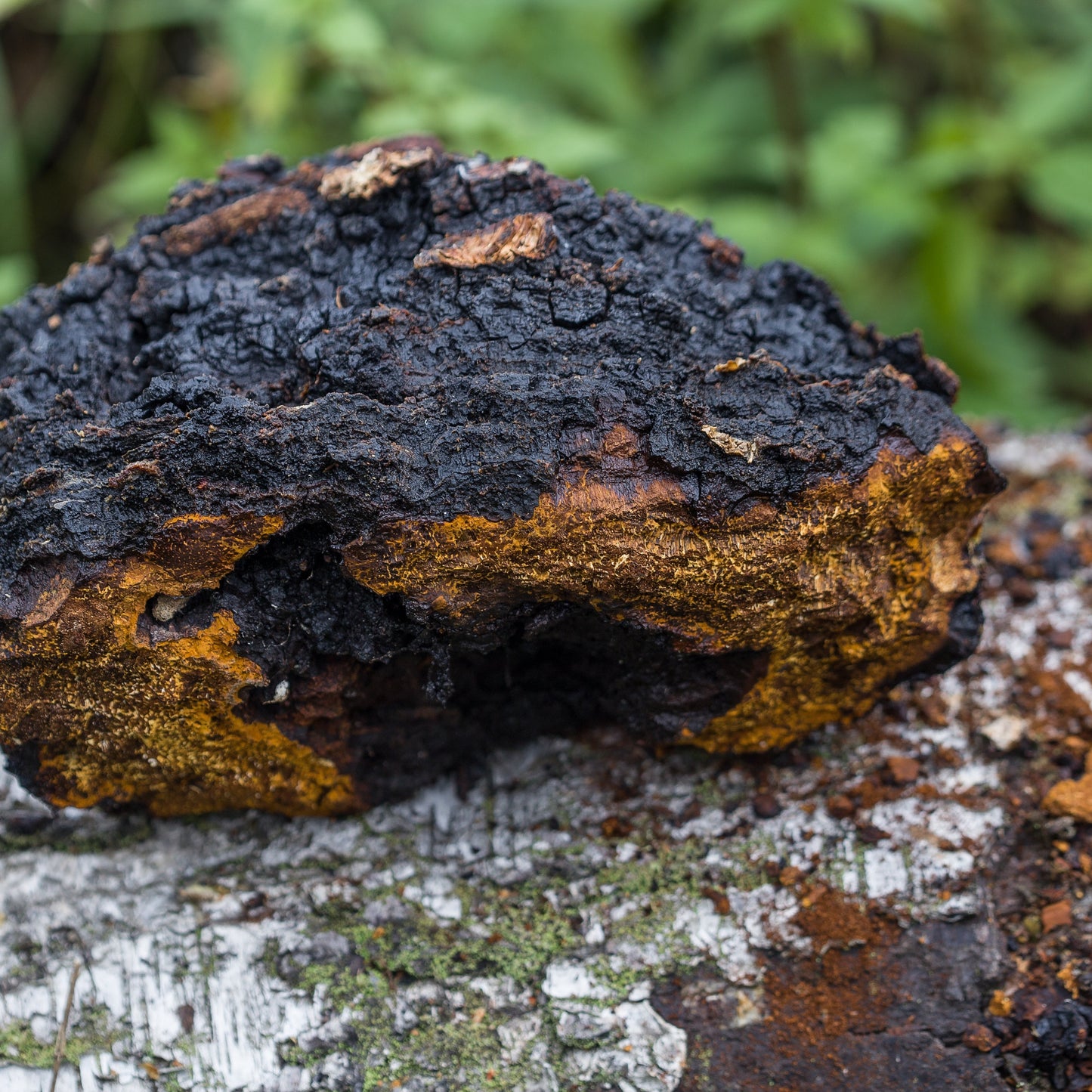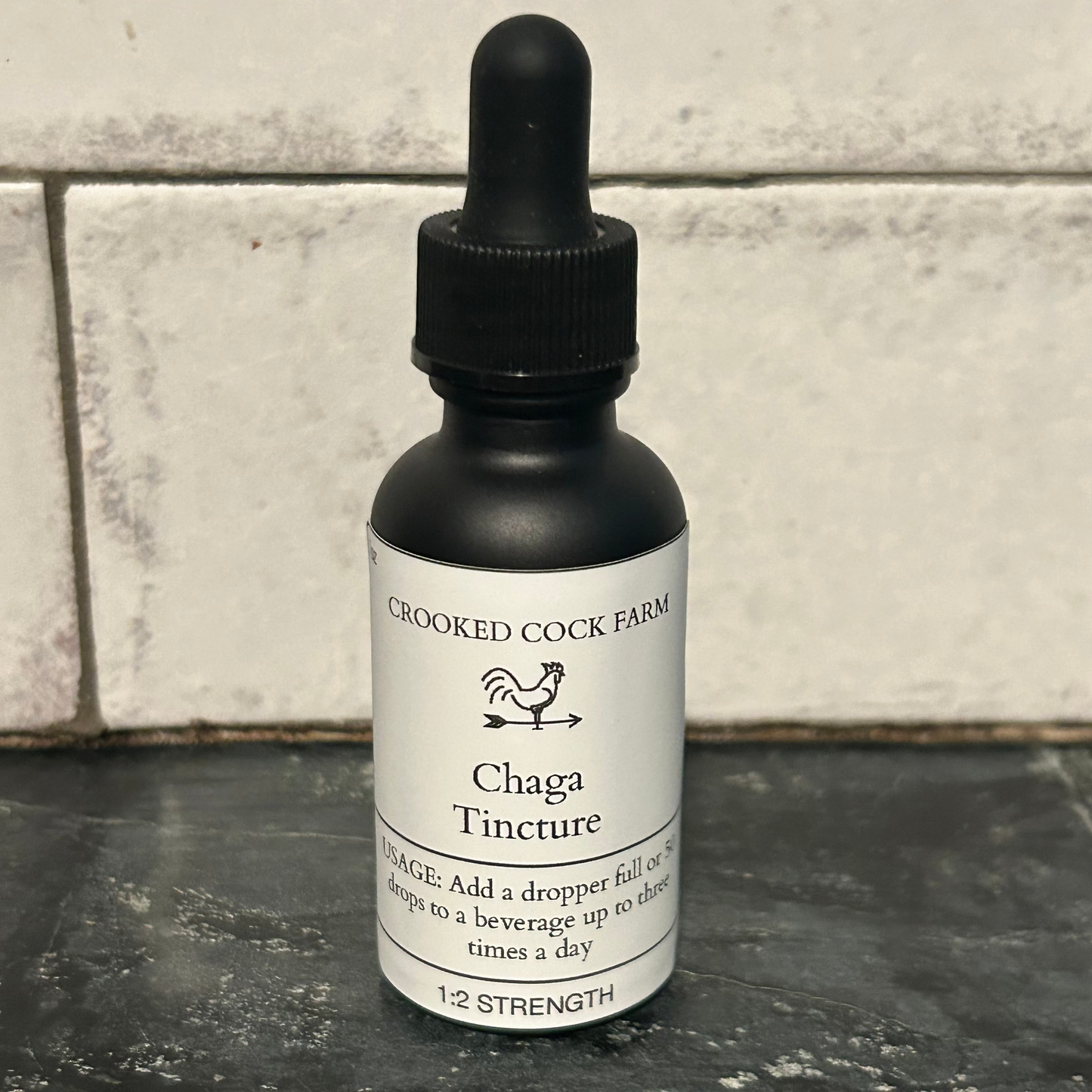Crooked Cock Farm
Chaga Tincture
Chaga Tincture
Couldn't load pickup availability
Our Chaga tincture is made from wild foraged Chaga fungus from the birch and chestnut trees on our property. Because it is naturally occurring in the forest, our ability to make this tincture is limited to when we find one of these beauties. Chaga is soften referred to as a medicinal mushroom, but it is a fungus packed full of antioxidant compounds.
Chaga Mushroom Nutrients
Chaga contains a wide variety of bioactive compounds responsible for its health effects. Below are some of the key constituents found in chaga:
Polysaccharides
Chaga is rich in beta-glucans, a polysaccharide known for its immune-boosting properties. These compounds may enhance the activity of immune cells, such as macrophages and T-cells, helping the body defend against infections and diseases. Beta-glucans are also found in other medicinal mushrooms like Reishi and Maitake, oats, seaweed, and algae.
Antioxidants
Chaga is an excellent source of antioxidants, including phenolic compounds and flavonoids. These antioxidants help combat oxidative stress and reduce cellular damage caused by free radicals and may increase superoxide dismutase and glutathione in the body.
Betulinic Acid
When growing on birch trees, chaga can accumulate betulinic acid from the tree. Betulinic acid has shown promising anti-inflammatory and anti-tumor properties in preclinical studies.
Melanin
Chaga’s dark color is due to its high melanin content. Melanin may act as an antioxidant and offer protective effects against oxidative stress. In the human body, melanin is responsible for skin pigmentation and helps block UV radiation, which can damage DNA in our skin cells, leading to skin cancer and aging. Nutrients like tyrosine and copper are important for melanin production.
Potential Chaga Mushroom Health Benefits:
1. Immune System Modulation
Chaga's immune-boosting properties are attributed to its polysaccharides, including beta-glucans. These compounds stimulate the production and activity of immune cells, enhancing the body's ability to fend off infections.
Specifically, beta-glucans have been shown in studies to activate the cells of our innate immune system. These cell types are the first-line response to pathogens and start fighting off infections before our immune system has started making specific antibodies to invading microbes. Additionally, chaga may improve the production of cytokines, or chemical messengers that help our immune cells communicate with one another.
2. Reduce Inflammation
Inflammation is implicated in the development of many chronic diseases. Betulinic acid, abundant in chaga, has exhibited anti-inflammatory effects in preclinical studies. These findings suggest chaga may have potential applications in managing inflammatory conditions because of its high betulinic acid content. Additionally, chaga contains other antioxidant and anti-inflammatory compounds, which may all help reduce oxidative damage from inflammation in the body.
3. Adaptogenic Properties
Chaga has been used in traditional medicine to promote vitality and overall health. This fungus is a potent adaptogen, a substance believed to help the body adapt to stressors and maintain homeostasis.
While chaga may not be as well-known as popular adaptogens like ashwagandha or rhodilioa, historical and traditional use confirm that chaga has long been used to help our bodies respond to the demands of our environment. Recent animal studies suggest chaga may improve physiologic response to stressful situations.
4. Antibacterial and Antiviral Effects
Beyond its immune system effects, chaga has been investigated for its antiviral and antibacterial properties. Some studies indicate that chaga extracts may inhibit the growth of certain viruses and bacteria.
One recent computer model-based study suggests constituents of chaga, including beta-glucans, betulinic acid, and other polysaccharides, may block the binding of SARS-CoV-2 with human cells. Although further research is needed, these findings suggest chaga may have potent antimicrobial properties against various pathogens.
Chaga may be a powerful ally for supporting the body’s response to invading pathogens due to both its antimicrobial and immune-stimulating actions.
5. May Support Healthy Blood Sugar and Metabolism
Chaga’s polysaccharide compounds have been shown to improve blood sugar regulation and cholesterol in animal studies. In one study, mice fed chaga polysaccharides had improved fasting blood sugar and reduced insulin resistance. Other animal model studies have shown chaga polysaccharides may reduce total cholesterol, LDL “bad” cholesterol, and triglycerides while raising heart-protective HDL cholesterol.
Since these studies have only been conducted on animals, there is no way of knowing if these effects translate to humans, but the results are promising and warrant more research on the effects of chaga on metabolism, blood sugar, and cholesterol.
Chaga Mushroom Side Effects
Chaga is generally considered safe for most individuals when consumed in moderation. However, there are some important considerations and potential risks for certain individuals.
Due to its potential blood-thinning effects, chaga may interact with certain medications, particularly anticoagulants and anti-platelet drugs. Individuals taking blood-thinning medications should talk to a healthcare provider before using chaga. Since chaga may lower blood sugar, individuals taking medications or supplements for diabetes should talk to a healthcare provider before using chaga.
Chaga contains oxalic acid, which can cause kidney problems or promote the development of kidney stones in high amounts. Individuals with a history of kidney stones or kidney disease should be cautious when using chaga.
Although rare, some individuals may be allergic to chaga, leading to allergic reactions when consumed. It is a good practice to start with a small dose to assess tolerance, especially if you are consuming chaga for the first time.
Please note that all of our tinctures are made with alcohol unless specifically noted otherwise.




